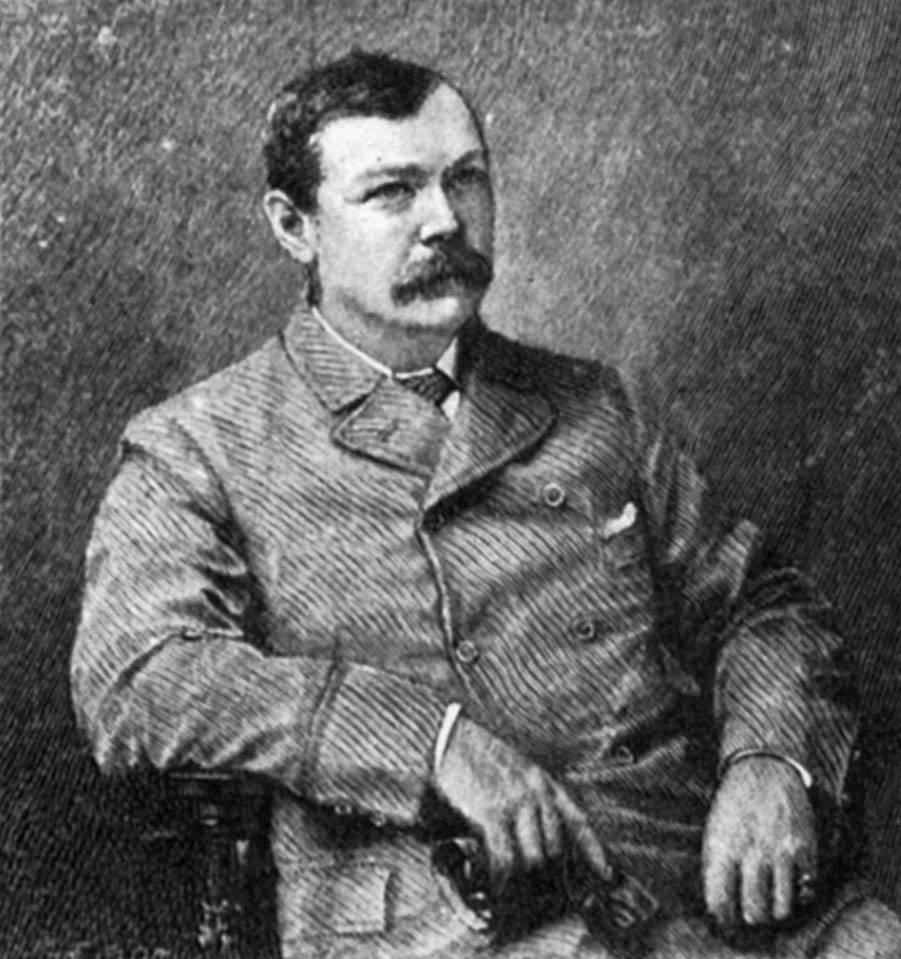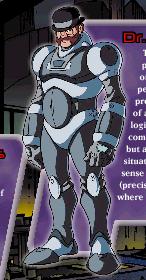 THE KICKER: Doctor John Hamish Watson, a friendly and well-regarded medical practitioner. After graduating from medical school, he spent some time in the army. Returning to his hometown of London, Watson finds himself looking for a place to stay, and a friend of his introduces him to a chemistry student by the name of Sherlock Holmes. More on him later. Watson is an average guy of average height, medium build, and with nothing more noticeable about him than a mustache. He’s intelligent, but not intensely clever. He’s brave, but no better a fighter than the average retired army surgeon. The only instance in which he is remarkable is in the sack, having "an experience of women which extends over many nations and three separate continents."
THE KICKER: Doctor John Hamish Watson, a friendly and well-regarded medical practitioner. After graduating from medical school, he spent some time in the army. Returning to his hometown of London, Watson finds himself looking for a place to stay, and a friend of his introduces him to a chemistry student by the name of Sherlock Holmes. More on him later. Watson is an average guy of average height, medium build, and with nothing more noticeable about him than a mustache. He’s intelligent, but not intensely clever. He’s brave, but no better a fighter than the average retired army surgeon. The only instance in which he is remarkable is in the sack, having "an experience of women which extends over many nations and three separate continents." WHO THEY’RE KICKING: Sherlock Holmes, his roommate and friend. Watson meets Holmes when they are just starting out their respective careers as a doctor and chemist, but they quickly settle into the roles we know them in, where Holmes is a detective of great renown. A severe eccentric, Holmes is capable of minute observations and connecting them in obscure but ingenious ways. Also, he loves him the coke.
WHO THEY’RE KICKING: Sherlock Holmes, his roommate and friend. Watson meets Holmes when they are just starting out their respective careers as a doctor and chemist, but they quickly settle into the roles we know them in, where Holmes is a detective of great renown. A severe eccentric, Holmes is capable of minute observations and connecting them in obscure but ingenious ways. Also, he loves him the coke. WHAT THEY BRING: Simply put, Watson brings two things to the table. Knowledge and humanity. ‘Knowledge?’ you ask, as well you might. Holmes is famous for his breadth of knowledge. Well, that’s actually an exaggeration from the books. Watson points out that while Holmes’s basic knowledge of science is formidable, and his analytical mind keen, he has no technique in science, (save chemistry, where his living is made) and he knows sweet fuck all about philosophy, astronomy, politics, and any literature that’s not a lurid true crime story.
WHAT THEY BRING: Simply put, Watson brings two things to the table. Knowledge and humanity. ‘Knowledge?’ you ask, as well you might. Holmes is famous for his breadth of knowledge. Well, that’s actually an exaggeration from the books. Watson points out that while Holmes’s basic knowledge of science is formidable, and his analytical mind keen, he has no technique in science, (save chemistry, where his living is made) and he knows sweet fuck all about philosophy, astronomy, politics, and any literature that’s not a lurid true crime story.Watson, on the other hand is well-versed in politics and current events, and as a medical doctor, knows much about the human body. Apart from the areas of his expertise, he has a general working knowledge on a lot of subjects. So Holmes knows a lot about little, and Watson knows a bit about a bunch. I did not mean to alliterate there, but I‘m not sorry I did. The idea that Holmes is a crazy genius comes from the fact that Watson tends to be brought in mid-case, after Holmes has been studying up on things, and he reads a lot and remembers trivia well. (There’s another reason, but we’ll get to that.)


And the humanity? Well, Holmes is kind of… socially retarded. He’s cold and disconnected to a rather shocking degree. Watson is at hand to smooth over rough edges, and deal with their clients as people, when Holmes couldn’t give a shit.
One more thing he brings to the table is his gun. Holmes doesn’t seem to remember he owns one, and is all the time telling Watson to get his. Come on, man, you’re a detective. You may be an expert at judo, baritsu, and boxing, but if that’s as handy as you act like it is, then you wouldn’t have to borrow your roomie’s gun all the time. To be fair, the only use Holmes ever put his gun to was shooting a “V.R.” into the wall of the apartment in an oddly violent show of patriotism.
 WHERE’S THE RESPECT?: Slowly increasing. For a long time, Watson was looked at as a fat idiot that followed Holmes around for god knows what reason. I don’t think it’s fair to blame any one person for this, but let’s go ahead and blame Nigel Bruce. Nigel Bruce was a comic character actor who played Watson opposite Basil Rathbone’s Holmes in a dozen or so movies and a couple hundred radio shows. The producers of these entertainments seemed to think that audiences would be uninterested in the adventures of two capable, intelligent people, and figured that since Holmes is so smart, Watson must be so stupid. Bruce’s Watson was a bumbling oaf who was so bad at deduction he needed Holmes to tell him what his breakfast was half the time.
WHERE’S THE RESPECT?: Slowly increasing. For a long time, Watson was looked at as a fat idiot that followed Holmes around for god knows what reason. I don’t think it’s fair to blame any one person for this, but let’s go ahead and blame Nigel Bruce. Nigel Bruce was a comic character actor who played Watson opposite Basil Rathbone’s Holmes in a dozen or so movies and a couple hundred radio shows. The producers of these entertainments seemed to think that audiences would be uninterested in the adventures of two capable, intelligent people, and figured that since Holmes is so smart, Watson must be so stupid. Bruce’s Watson was a bumbling oaf who was so bad at deduction he needed Holmes to tell him what his breakfast was half the time.“An egg? Why Holmes old boy, what makes you say that?”
“Elementary, my dear Watson, it’s round and white, with a squishy yellow bit.”
“Brilliant, Holmes, just brilliant!”
He probably had time to work cases with Holmes because he had scared off any patients he hadn’t poisoned or mutilated.
 This Watson stayed prominent in the minds of the public for some time, and any version that put him on Holmes’ level was a deconstruction, a la the 1988 film Without a Clue, where the genius Watson (played by Ben Kingsley) hired a bumbling actor (played by Michael Caine) to be his front man, or Nicholas Meyer’s The Seven Per-Cent Solution, where Holmes (played by Nicol Williamson) was depicted as a drug-addled lunatic who made up Moriarity because his math teacher had sex with his mother, with Watson (played by… Robert Duvall? Huh.) running around cleaning up his messes. But little by little, the love started coming in. The most prominent example was the BBC series The Adventures of Sherlock Holmes, whose producers were well aware that Holmes, being a serious-minded fellow, would want a partner who could find his ass with both hands, a map, a flashlight, and an electrified ass-finder.
This Watson stayed prominent in the minds of the public for some time, and any version that put him on Holmes’ level was a deconstruction, a la the 1988 film Without a Clue, where the genius Watson (played by Ben Kingsley) hired a bumbling actor (played by Michael Caine) to be his front man, or Nicholas Meyer’s The Seven Per-Cent Solution, where Holmes (played by Nicol Williamson) was depicted as a drug-addled lunatic who made up Moriarity because his math teacher had sex with his mother, with Watson (played by… Robert Duvall? Huh.) running around cleaning up his messes. But little by little, the love started coming in. The most prominent example was the BBC series The Adventures of Sherlock Holmes, whose producers were well aware that Holmes, being a serious-minded fellow, would want a partner who could find his ass with both hands, a map, a flashlight, and an electrified ass-finder. And most subsequent versions have held to this. The sci-fi cartoon series “Sherlock Holmes in the 22nd Century” held Watson so vital to Holmes that the police that cloned him gave him a robo-Watson. (I have seen one episode of this show. It was an adaptation of “The Man With the Twisted Lip”, and it was better than it had any right to be.) In the upcoming BBC pilot “Sherlock”, a modern-day adaptation, Watson will be played by Martin Freeman, who though schlubby and goofy, is also eminently likable. (Holmes is being played by a guy called Benedict Cumberbatch. How awesome is that?)
And most subsequent versions have held to this. The sci-fi cartoon series “Sherlock Holmes in the 22nd Century” held Watson so vital to Holmes that the police that cloned him gave him a robo-Watson. (I have seen one episode of this show. It was an adaptation of “The Man With the Twisted Lip”, and it was better than it had any right to be.) In the upcoming BBC pilot “Sherlock”, a modern-day adaptation, Watson will be played by Martin Freeman, who though schlubby and goofy, is also eminently likable. (Holmes is being played by a guy called Benedict Cumberbatch. How awesome is that?)On top of all that, Guy Ritchie is releasing a Sherlock Holmes movie this year, and I’m sure that Watson will be…

Oh, come on. There’s respecting a classic character, and then there’s just overcompensating.